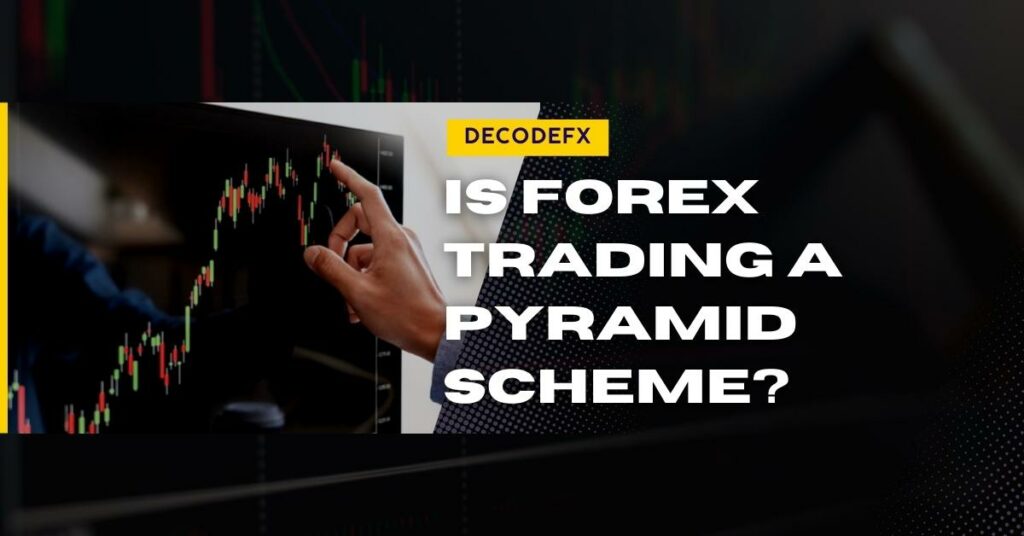One of the most interesting questions that people ask is, “Is Forex a pyramid scheme?” While it’s easy to see how one could make that argument, given that there are so many different ways to trade forex, the answer is quite simple: no, forex trading is not a pyramid scheme. In this guide, we will explain what a pyramid scheme is, how forex trading works, and how you can avoid getting scammed when participating in the forex market.
What is Forex trading actually for?
Forex, also known as foreign exchange or currency trading, is the act of buying and selling currencies to make a profit. The foreign exchange market is the largest and most liquid market in the world, with a daily turnover of over $5 trillion. Forex trading takes place 24 hours a day, 5 days a week, across all major financial centers around the world.
How do Forex traders participate in the market?
Most forex trading is done through brokerages and banks. To trade forex, you must have an account with a broker that offers forex trading services. Brokers provide access to the market and allow you to buy and sell currencies. They also provide other services such as leverage, which allows you to trade with more money than you have in your account, and margin, which allows you to trade with less money than you have in your account.
Is Forex trading actually a pyramid scheme?
A pyramid scheme is an illegal way to make money that involves recruiting people to invest in a product or service, promising them returns that are based on the investment of other people. Forex trading is not a pyramid scheme because it is not an investment. Instead, it is a way to make money by buying and selling currencies. There is no recruitment involved in forex trading, and there are no promises made about returns. In comparison, a pyramid scheme would be something like a Ponzi scheme, where people are promised returns that are not based on anything other than the investment of other people. On the other hand, forex trading is a way to make money by buying and selling currencies on the foreign exchange market.
How to Detect Forex Trading Scams
Many scams purport to offer opportunities to make money through forex trading. These scams often involve promising returns that are based on nothing more than the investment of other people. If you are approached by someone who claims to be able to help you make money through forex trading, be sure to do your research before investing any money. Some red flags to look out for include:
1. Promises of guaranteed or unrealistic returns
Most scams will promise guaranteed or unrealistic returns. While it is possible to make a profit through forex trading, there are no guarantees. People who want to scam others will often promise guaranteed returns to get people to invest money.
2. Offers of free or low-cost services
Another red flag to look out for is offers of free or low-cost services. While there are some legitimate forex brokers and providers of other services, most scams will try to entice people with offers of free or reduced-cost services. For example, a scammer may offer to provide a forex trading platform for free or at a reduced cost.
3. Pressure to invest quickly
Scammers will often try to pressure people into investing quickly by telling them that the opportunity is only available for a limited time. They may also claim that the sooner you invest, the greater your chances of making a profit. If you are pressured to invest quickly or told that the opportunity is only available for a limited time, you will likely be scammed.
4. Lack of transparency
Another red flag to look out for is the lack of transparency. Scammers will often try to hide fees or other charges associated with their services. They may also refuse to provide information about their company or their employees. The lack of transparency is a warning sign that you may be dealing with a scammer.
5. Unregistered companies
Forex brokers and other financial services providers must be registered with the appropriate regulatory body in many countries. If you are dealing with a company that is not registered, they are likely operating a scam.
If you are approached by someone who claims to be able to help you make money through forex trading, be sure to do your research before investing any money. Many scams purport to offer opportunities to make money through forex trading, so it is important to be aware of the signs of a scam.
Can Participating In Forex Make You Rich?
Well, the answer to this question is both Yes. You can get rich by trading Forex, but it is not easy, and you have to be disciplined, patient and have a solid trading plan. If you don’t have these qualities, it will be very difficult to make consistent profits in the long run.
Many people start trading Forex without any knowledge or experience, and they quickly lose all their money. So, if you want to get rich through Forex trading, you must educate yourself first and develop a solid trading plan. Becoming a successful Forex trader takes time and effort, but it is definitely possible.
Is Forex Trading a Form of Gambling?
No, forex trading is not a form of gambling. Gambling is defined as staking something on a contingency. Forex trading is a form of investing. The main difference between the two is that when you gamble, you are putting your money at risk with the hope of making a profit, while with investing, you are also putting your money at risk, but you have a higher chance of making a profit.
When you trade forex, you are speculating on the movements of currencies against each other. You are not gambling because you have a solid plan and strategy to follow. You know what you are doing and why you are doing it. You have calculated the risks and rewards before entering into a trade.
4 Types of Common Scams Found in Forex Trading
Now that we have looked at what forex trading is and how it works let’s take a look at some of the scams that are commonly found in the forex market.
Type 1: The Fake Forex Broker
There are many fake forex brokers out there who are trying to scam people. They will offer you low spreads and high leverage, but they will never execute your trades at the prices you want. They may also ask for a large deposit and then never allow you to withdraw your money.
Type 2: The Ponzi Scheme
A Ponzi scheme is a type of fraud where people are promised high returns with little or no risk. The people running the scheme will use the money from new investors to pay the old investors, giving the appearance of high returns. However, eventually, the scheme will collapse when there are not enough new investors to keep it going.
Type 3: The Managed Account Scam
In this type of scam, you will be asked to deposit money into a managed account. The account manager will then trade on your behalf and take a percentage of the profits. However, the trades that they make will often be based on inside information or guaranteed to lose, meaning that you will end up losing all of your money.
Type 4: The Signal Provider Scam
Many scammers claim to have a winning strategy for trading forex. They will offer to sell you their signals for a monthly fee. However, these signals are often inaccurate and lead to losing money.
4 Factors to Consider When Dealing With Forex Scams
If you are considering investing in forex trading, there are a few things that you need to keep in mind to avoid being scammed.
1. The Company’s Registration
One of the first things that you should look at when considering a forex company is whether or not they are registered with the proper regulatory bodies. In the United States, this would be the National Futures Association (NFA) and the Commodity Futures Trading Commission (CFTC). This would be the Financial Conduct Authority (FCA) in the UK. If a company is not registered with these bodies, then you should avoid them.
2. The Company’s Location
Another thing to consider is the company’s location. If a company is located in a country with lax regulations regarding forex trading, then you should be wary of them. For example, many forex companies in the Cayman Islands and Bahamas are known for having very lax regulations.
3. The Company’s Reputation
The next thing to consider is the company’s reputation. You can look up reviews of forex companies online to see what other people have said about them. You should also check to see if the company is a member of any industry associations such as the NFA or FCA.
4. The Terms and Conditions
Finally, you should always read the terms and conditions of any forex company before investing with them. This is important because it will give you an idea of what you are getting yourself into. For example, some forex companies may have hidden fees or charges you were unaware of.
Is Forex trading considered MLM?
No, forex trading is not considered to be a form of multi-level marketing (MLM). MLM is a type of business model where people are recruited to sell products or services and earn commissions on the sales made by their downline. In contrast, forex trading is a speculative activity where people trade currencies in the hope of making a profit.
5 Tips For Avoiding Forex Scams
Now that you know some of the common types of forex scams, here are a few tips to help you avoid them:
1. Do Your Research
One of the best ways to avoid being scammed is to do your research. This means that you should check out a company before investing with them. You can look up reviews online and make sure that they are registered with the proper regulatory bodies.
2. Avoid Offshore Companies
As mentioned earlier, you should be wary of companies that are located in countries with lax regulations regarding forex trading. These companies may not have your best interests in mind and could be more likely to scam you.
3. Avoid High-Pressure Sales Tactics
If a company is trying to pressure you into investing, you should be wary of them. A reputable company will not try to pressure you into investing and will give you time to make a decision.
4. Read the Terms and Conditions
As we mentioned earlier, it is important that you read the terms and conditions of any company before investing with them. This way, you will know what you are getting yourself into and can avoid any hidden fees or charges.
5. Use a Regulated Broker
If you are going to trade forex, then you should use a regulated broker. This way, you can be sure that your broker is legitimate and that your money is safe.
Sign up On Decode Global and Avoid Forex Trading Scams
Decode Global is a trusted broker Regulated by tier-1 financial regulatory agencies. To use our cutting-edge Forex trading platform, signup for a free demo or live account and start trading forex today.
Read Next: Choose a Forex Broker: A Brief Guide for Beginners

